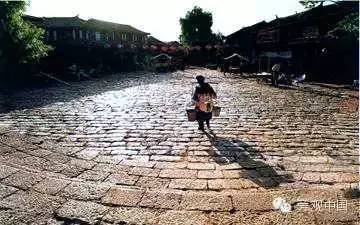
特约作者 马威(William Spence) | 文
(一)
一直以来,丽江的历史都是被周边自然环境塑造出来的。几个世纪里,向东奔流的长江为纳西族的人们提供了肥沃的耕地,而北侧广阔的喜马拉雅山麓则是一道天然屏障。
■ The history of Lijiang has always been shaped by the nature that surrounds it. For centuries, the Naxi people were provided for by the fertile fields of the Yangtze river that spreads out to the east, and protected by the vast Himalayan mountain range that dominates its northern region.
1997年,丽江古城被联合国教科文组织列为世界文化遗产。自那以来,这座城市所经历的改变足以体现中国发展与增长的巨大能量。丽江当地人口从5万人激增到了120万,每年的游客数量也从170万增加到了500万。
■ Since the city’s historic Old Town was granted UNESCO heritage status in 1997, Lijiang has undergone changes that illustrate China’s immense capacity for progress and growth. The population has swelled from 50,000 to 1.2 million, and the number of annual tourists risen from 1.7 million to 5 million.
在他1955年出版的回忆录《被遗忘的王国》中,俄罗斯作家兼探险家顾彼得 (Peter Goullard)回忆了他在这个中国西南部沉寂的小镇上8年的生活时光。他将自己融进纳西族、藏族、彝族、怒族和白族文化微妙的平衡之中,在这里铺满鹅 卵石的街道和肆意漂流的河渠之间找到了属于自己的“天堂”。直到1949年共产党人到来,他才被迫离开。
■ In his 1955 memoir The Forgotten Kingdom, Russian writer and explorer Peter Goullard recounts the eight years he spent living in this sleepy town in Southwest China. Integrated amongst the delicate cultural balance of Naxi, Tibetan, Yi, Lissu and Bai, he found his ‘paradise’ here in the cobbled streets and drifting waterways, before being forced to leave when the Communists moved in in 1949.
走在今天的丽江,你如果 想要让眼前所见与顾彼得描绘的那个地方产生共通感,实在是很难。一队队密集的游客和单调重复的仿冒文化商铺,让古城迷失在了传统和现代商业之间的某个地 方,在旧中国与迪斯尼乐园之间达到了一种不太真实的平衡。在过去,很多途经此地的商人成为了山中土匪的受害者;而对今天的游客们威胁更大的,似乎是那些过 度热情的牦牛肉商贩。
■ Walking through Lijiang today, it is hard to negotiate a sense of the place evoked in Goullard’s writing with what you see in front of you. With its dense lines of tourists and monotonous repetition of faux-cultural shops, the Old Town strikes an unlikely balance of Old China and Disneyland, lost somewhere between the traditional and the commercial. Whereas many a trader of the past fell victim to the bandits in the surrounding hills, today’s visitors seem most at risk from overenthusiastic yak-meat vendors.
虽然很多商店、餐馆和旅店的招牌里都写着“纳西”或“东巴”(纳西族的宗教),但是它们大多数都是由长期 租下场地的汉族人经营。在访问丽江古城保护管理局的时候,我被告知:“在地产购买和租赁方面没有和种族相关的规定。不管你是纳西族,还是汉族或是外国人, 规定都是一样的。”
尽管有这样的平等性,但纳西族人不可能和来此的汉族生意人比拼财力。因此,这座古城看起来似乎更多地是在削弱纳西文化,而不是保护它。
■ Although many of these shops, restaurants and guesthouses bear the names of Naxi or Dongba (the Naxi religion) in their title, the majority are run by Han Chinese, renting the space on long term leases. On visiting the Lijiang Old Town Conservation Bureau, I was told that: ‘There are no rules that discriminate in terms of race when it comes to buying or renting property. Whether you are Naxi, Han or a foreigner, the same rules apply.’ Despite this apparent equality, there is no way the Naxi can compete financially with the many Han businessmen who come here. As such, the Old Town appears to be doing more to undermine Naxi culture than it is to protect it.
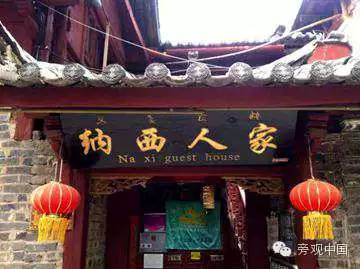
▲写着“纳西”却实由汉族人经营的客栈。马威/图
文化上和空间上的“污染”并没有被漠视。2008年,联合国教科文组织带领的一个“反应性监督团”来到了这座古城,评估旅游相关活动产生的影响。该组织其后发布的报告中多次提到,“有形和无形的”文化遗产需要得到保护,其中后者的需求更为迫切,注意到建筑被拆毁是一件事,但是更难量化的,是在废墟中丢失的文化认同感。
■ This cultural and spatial pollution has not gone unnoticed, and in 2008 UNESCO led a ‘Reactive Monitoring Mission’ to the Old Town to assess the impact of tourism-related activities. The subsequent report repeatedly refers to the ‘tangible and untangible’ cultural heritage in need of protection. The latter is the most pressing issue, it being one thing to notice a building being torn down, but another much more difficult task to quantify a sense of the cultural identity that is lost in the rubble.
从西方的视角来看,这是极为熟悉的故事情节。
■ From western point of view, this sounds like a familiar story.
(二)
和则伟的英文名是Richard,他的家族在300多年前从白水台搬到了丽江,已经在这里生活了17代。
他出生于文化大革命时期,在过去20年中都从事导游工作,并经营着一家旅店——旅店就坐落在他从小长大的四合院中。和则伟居住的开文村位于古城区东面两公里处,隔开这两个地方的,是在所有中国城市郊区都可以见到的、尘土飞扬的荒地。
■ ‘Richard’ He Zewei’s(和则伟) family have lived in Lijiang for 17 generations, moving south from Baishuitai more than 300 years ago. He was born here during the Cultural Revolution, and for the last 20 years has worked as a tour guide and run a guest house from the Siheyuan courtyard house where he grew up. His village, Kaiwen, lies 2 km east of the Old Town, separated by the kind of dusty wasteland you see on the outskirts of all Chinese cities.
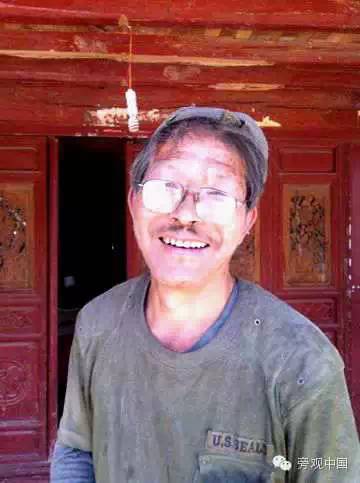
▲旅店老板和则伟。马威/图
当我问和则伟涌入的旅游者们是否破坏了纳西族文化认同感时,他笑了:
■ When I ask him whether the influx of tourists has destroyed a sense of the Naxi culture, he laughs.
“外国人老是问我这个问题。每次都是。”
■ ‘Foreigners always ask me this. Always.’
在他的眼里,旅游业带来的好处远远超过了坏处,而且不仅仅是在最明显的金钱层面。在我看到阶层分化和文化压迫的地方,他看到的却是自豪和学习的机会。
■ In his eyes, the benefits of tourism far outweigh the drawbacks, and not just in the most obvious financial sense. Where I see gentrification and cultural oppression, he sees pride and opportunity to learn.
“过去纳西族的人认为,那些出过国的人比剩下这些没去过的人要更优秀。” 和则伟说:“即使是在北京、上海、广州这样的城市居住过的人,社会地位也要高一些。”
他说,游客的进入不仅没有稀释或摧毁纳西族的文化,反而重新激活了一种文化自豪感。“现在是我们这些留下来的人会被高看了,因为我们更了解纳西族的文化。来这里的人越多,我们保留自己文化的意愿就越强烈。”
■ ‘In the past’ Richard says ‘Naxi people who had been abroad were considered better than the rest of us who hadn’t. Even those who had lived in cities like Beijing, Shanghai and Guangzhou had higher social status.’ The influx of tourists, rather than dilute or destroy Naxi culture, has re-invigorated a sense of cultural pride. ‘Now it is those of us who stayed who are looked up to, because we better understand the Naxi culture. The more people come here, the greater our desire to preserve our culture’.
为了吸引外人过来,就需要一个清晰的、有组织的商业计划。在这件事上,看起 来纳西族人似乎并没有过度骄傲或固执,他们接受了现实——这不是他们的强项:“纳西族人对于做生意并不在行。我们可以做东西,但是我们不会卖;我们会烧 菜,但是我们的餐馆不干净。汉族人是更好的生意人,能吸引人们来这儿。就像在美国,那个戴眼镜的、肯德基那个人,他的食物并不好吃,但是人们会去那里,因 为那是经营得挺好的生意。”
■ For those people to come, a clear and organized business plan is needed, and it seems the Naxi are not too proud or stubborn to accept that this is not one of their strengths. ‘Naxi are not good at business. We can make things, but we can’t sell them. We can cook, but our restaurants are dirty. Han people are better businessmen, and this attracts people to come here. It is like in America, the man with glasses from KFC, his food is not delicious but people go there because it is a well-run business’.
过去20年中,外部力量对于丽江的发展的确扮演了极为重要的角色。非常说明问题的一 个例子是,1990年代起出现的丽江旅游热并不是由省级政府和当地人发动的,其实是中央政府发现了这个地区的潜力:亚热带气候,优美的自然风光和正宗的当 地文化。要改变这个长久以来一成不变、与世隔绝的小镇,所需要的只是一个机场和一场细心策划的宣传。
我问和则伟,纳西人早先的生活是怎样的?他用古老的中国谚语解释说:“我们是捧着金碗要饭。被这么漂亮的自然风光包围,但却过着很低水平的生活。”
■ Outside influence has indeed played a huge role in shaping the course of events of the last two decades, and it is telling that the tourism boom of the 90’s wasn’t instigated by the provincial government or local people, but by the central government, who saw the potential that lay in the region’s subtropical climate, natural beauty and authentic local culture. In the end, all it took was an airport and a carefully planned promotional campaign to change the face of a town that had for so long remained unchanged, isolated unto itself. When I ask Richard what life was like for the Naxi people before then, he used an old Chinese idiom to explain: ‘We were begging with golden bowls. Surrounded by such natural beauty, but living a very low standard of life’.
当他如此充满激情地声援旅游业时,我突然有些感悟:当一个地方因为旅游气息太重或过于拥挤而被人否定的时候,通常都没有考虑到当地人的看法。
游客(包括我在内)很容易就掉进了怀旧的感觉陷阱,去追忆一段自己未曾经历的时光和文化,并且还将这种情感投射到本地人身上——这些人过去和现在生活在这里,和这个地方绑在一起。也许这是不可避免的吧。
今天的很多游客会渴望体验到顾彼得当年所在的那座丽江城,而顾彼得自己也曾梦想能体验一个已逝去的、“完美隔绝”的年代。现实情况则是,纳西人有任往日逝去的胸怀,这让他们能够拥抱未来,逐浪向前,而不是转身抗拒。
■ As he speaks with such passion in support of tourism, it strikes me that when a place is dismissed as too touristy or too crowded, it is often done so without any consideration for the local people. Tourists, myself included, all too easily fall into the trap of feeling nostalgic for a time and a culture they never knew, and project this sense of loss onto the people whose lives, past and present, are so inherently bound to the place. Perhaps this is unavoidable, and while many visitors of today yearn for the Lijiang Goullard experienced, he too dreamed of the ‘perfect isolation’ of a bygone era. The reality is that it is the Naxi people’s ability to let go of this past that allows them to embrace their future, riding the wave rather than turning their backs against it.
(三)
在保存纳西族的象形文字、绘画、音乐和舞蹈上,东巴教起到了整体性的作用,并由东巴祭司们负责将它们传授给下一代。
和力民是东巴文化研习馆的负责人,他已经在这里开展了近20年教学,并且曾经在美国和英国讲授东巴文化。
■ The Dongba religion plays an integral role in preserving the unique pictographic script, painting, music and dance of Naxi culture, and Dongba priests are responsible for passing these on to the next generation. He Limin(和力民), Director of the Dongba Institute, has taught for nearly 20 years and lectured on Dongba culture in both the US and UK.
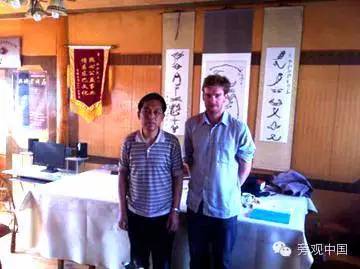
▲我与和力民。马威/图
我见到他的地方,是他位于古城南山的办公室,窗外近处是铺满瓦片的房顶,远处则是矗立在天际线上的玉龙雪山。他衣着朴素,谈吐淡定,和我一路上见到的其他东巴祭司有很大的反差——后者通常全身盛装,在游客拍照时恪尽职守地露出微笑。
■ When I meet him he is in his office on the south hill of the Old Town, overlooking a field of tiled rooftops and the Jade Yulong Snow Mountain that rises up on the horizon. His plain clothes and the solemnity with which he approaches the topic stands in stark contrast to the many other priests I walked past on the way there, dolled in full Dongba get-up, smiling dutifully for tourists’ pictures.
“在1990年代中期,我们的文 化处于严重的威胁之下。很多古老的书卷在文化大革命时期被毁掉了,之后的一段时间里宗教活动的开展也很困难。30年前,当我开始对成为一名东巴(祭司)产 生兴趣的时候,所有导师都已经很老了。那时我觉得他们很快就会离世,过去的传统也会随他们一起入土。”
■‘In the mid 90’s, our culture was under serious threat. So many of our ancient manuscripts were destroyed during the Cultural Revolution, and in the following years the government made it hard for us to practice our religion. When I first became interested in becoming a Dongba 30 years ago, all the instructors were very old, and at that time I was sure the day would soon come when they would die, and the traditions of the past would die with them.’
但是和力民的学校现在欣欣向荣,约有200名学生在东巴文 化研习馆上课,他还在云南西北部地区用私人身份教授更多的学生。课程被分为两个类型:入门课程针对那些想要了解更多纳西语言和文化的人,一门更为严肃的课 程则针对那些有心成为东巴祭司的人。上后一门课需要流利地掌握纳西族的语言,并且至少有五年的训练。
■ But his school is now thriving. On top of the 200 or so students who come to the Dongba Institute, He teaches many more in private settings around north-west Yunnan. Classes are divided into two categories- introductory classes for those with an interest in learning more about Naxi language and culture, and a more serious class for those with ambitions of becoming Dongba priests themselves. For the latter, fluency in Naxi language and at least 5 years of training is required.
对于这种运势的变化,和力民给出的解释与和则伟所说的遥相呼应:“之前好多年,东巴文化都被认为是和旧社会(1949年前的中国)联系在一起的、带有煽动性的。当我们纳西族人意识到游客对我们的文化有多么感兴趣的时候,我们身为纳西人才有了重新生发的自豪感。”
■ He’s explanation for this change in fortune echoed what Richard had told me earlier. ‘For many years Dongba religion was seen as something subversive, tied to the Old Society (China pre-1949). When Naxi people realized just how interested the tourists were in our culture, there was a re-newed sense of pride in what it meant to be Naxi.’
跟随旅游业的魅力而来的当然也有一些弊端。和力民告诉我,有学生在学习了几堂课后就离开了,然后自称东巴专家,从游客那里挣钱。但是任何在中国呆过一段时间的人都知道,从精神领域到商业领域,这种冒充内行的骗子在生活中无处不在,并非纳西文化所特有。
另一方面,和力民注意到古城店面招牌上有很多拼写错误的东巴象形文字:“从下个月开始,我会出门去更正它们。我去年决定搬到这里来的原因之一,就是要确保古城代表了正宗的纳西文化。”
■ There are drawbacks that are associated with the allure of tourism. He tells me there have been cases of students dropping out after just a few lessons, then presenting themselves as Dongba experts to make money from tourists. But anyone who has spent any time in China will know that such charlatans are ubiquitous to all aspects of life, from the spiritual to the commercial, and it is hardly a problem unique to Naxi culture. As for the miss-pelt Dongba pictographs that He has noticed on many of the Old Town shops: ‘Starting next month I’ll be going out and correcting them. That is part of the reason I moved here last year, to make sure the Old Town represents an authentic view of our Naxi culture.’
(四)
东巴文化的核心是人与自然和谐的重要性, 旅游业也在这个方面帮助了纳西文化复兴——虽然它是在不经意间做到的。因为旅游带来的收入,丽江不需要依赖其他更“脏”的收入。小城仅有的几座毛时代的工 厂在丽江“申遗”的时候就关闭了。从这个意义上说,是旅游业让丽江和污染隔绝——后者是中国许多其他地区都获得的、一种不必要的坏名声。
与我交谈过的汉族游客们在谈起来丽江旅游的原因时,无一例外的提到“干净的空气、蓝天、优美的自然”。虽然古城里存在的粗俗可能让某些人觉得碍眼,但它总强过游客们平时群居的中国都市,那里的天际线上满载着雾霾。
■ Central to the Dongba religion is the importance of harmony between man and nature, and here we find another aspect in which tourism appears to be helping this cultural rejuvenation, albeit inadvertently. Because of revenue generated by tourism, Lijiang dosen’t need to rely on other, dirtier forms of income. The handful of factories that appeared around town during the Mao era were closed down when Lijiang applied for UNESCO heritage status. In this sense, tourism stands between Lijiang and the pollution that other Chinese have gained such an unwanted reputation for, and the Han Chinese tourists I spoke to were unanimous in their reasons for visiting Lijiang: ‘Clean air, blue skies, beautiful nature.’ While the crassness of the Old Town may be an eyesore for some, it beats the smog laden skylines of the Chinese cities from where these tourists flock in such great volume.
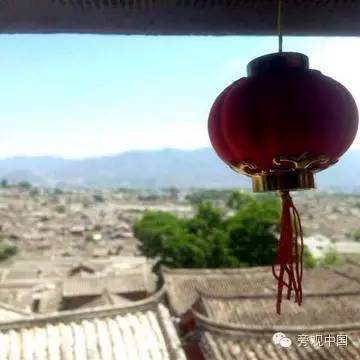
▲从客栈看出去的丽江古城。马威/图
在过去20年里,丽江从自给自足的村庄,变成了全球第一人口大国里最受欢迎的旅游胜地,即使按中国标准,这种变化速度也是异乎寻常的。这不仅带来了如何定义丽江身份的问题,也让预测它的未来变得很困难:这个城市在十年后会是什么样?或者在仅仅五年后会如何呢?
■ The sheer pace of change that Lijiang has seen over the last 20 years, from self-serving village to the most popular tourist destination in the world’s most populous country, is remarkable even by Chinese standards. This not only raises issues with defining a sense of Lijiang’s identity, but also makes it difficult to say where it is heading. What will the city look like in 10 years? What will it look like in 5?
再 回看顾彼得的书,我们可以发现,过去20年的发展也许并非“不可预测”,而更多的属于“不可避免”。在评论纳西族当年反对建设一条连接外部的公路一事时, 他写道:“纳西族现在还不想要太多的西方文明。这条公路给他们宁静的土地带来的麻烦将会超过好处。这个小镇将会被大群的冒充小商贩的汉人骗子和闲汉淹 没。”
■ Going back to Goullard once more, we can see that the developments of the past 20 years were perhaps not so much unpredictable as inevitable. Discussing Naxi opposition to a highway linking Lijiang to the outside world, he wrote:‘The Nakhi(an old spelling for Naxi) did not want too much of western civilization just yet. The highway would bring much more trouble than benefit into their peaceful land. The little town would be swamped by hordes of Chinese crooks and loafers, in the guise of small traders’.
无论想还是不想,这种“西方文明”已经被强加给了丽江和这里的人们。他们现在正在这种新环境里繁荣兴旺,旅游业的增长也带来了新一波的文化自豪感。
然而没有成型的组织架构来对这些增长加以控制,在这样的情况下,旅游业的进一步发展是会继续给纳西族带来益处,还是会引出一个拐点呢?
■ Want it or not, western civilization has been thrust upon Lijiang and its people. So far, they have thrived in this new environment, and the growth of tourism has brought on a renewed sense of cultural pride. But with no real structure in place to control such growth, will a further increase in tourism continue to benefit the Naxi, or is there a tipping point?
尽管谈论了这么多集体自豪感,对文化挑战的最深刻体会还是在个人层面。就在我逗留丽江期间,一个来自加拿大的家庭拜访了和则伟的旅馆,询问是否可以长期租赁他四合院的一面。和则伟有点犹豫:这样出租能提供更稳定的收入,但是也要付出些代价。
■ For all the talk of a collective sense of pride, the biggest cultural challenges will always be felt most poignantly at an individual level. During my stay, a Canadian family drop by at Richard’s Guesthouse, inquiring about renting one side of the courtyard on a long-term lease. He is hesitant, the rent would provide a more stable income, but would come with a cost of it’s own.
“一百个人有一百个想法。有的人想建个游泳池,有的人想要敲掉墙的一部分……”
■ ‘100 people have a 100 different views. Some want to build a swimming pool, some want to knock down a part of the wall...’
在他仔细考虑这个租约的时候,我不得不生出这样的感觉:旅游业和它带来的“大礼包”,在将来会造成更多的问题。
■ As he contemplates the offer, you can’t help but feel that tourism and the baggage it brings will pose more questions in the future.■
(财新见习记者 曹源 译)
 |
关于作者: 马威(William Spence),生于腐国,长于伦敦。资深球迷,自从出生。大学毕业,曾在京北漂。差点出演哈利波特电影里的罗恩。目前为财新网/旁观中国特约作者。 |
尝试输入关键词:「精选」「旁观史」「旁观者」「简介」「投稿」或日期,如「140304」「140515」获取更多精彩内容!
旁观中国 精选全球舆论对中国话题的报道、分析和评论,发掘“吐槽”与深意
→欢迎大家发来投稿、评论或文章推荐。直接回复微信或邮件至onchina@caixin.com
→添加关注的三种方式:
1)拉至文章页面最上方,点击标题下蓝色【旁观中国】可关注;
2)在【添加好友】--->【搜索公众账号】中查找:on_china;
3)通过微信扫描下方第二张图片二维码


特别声明:旁观中国由财新传媒出品。旁观中国所刊载内容之知识产权为财新传媒及/或相关权利人专属所有或持有。未经许可,禁止进行转载、摘编、复制及建立镜像等任何使用。请认准旁观中国唯一之微信号:on_china。
0
推荐




 京公网安备 11010502034662号
京公网安备 11010502034662号 